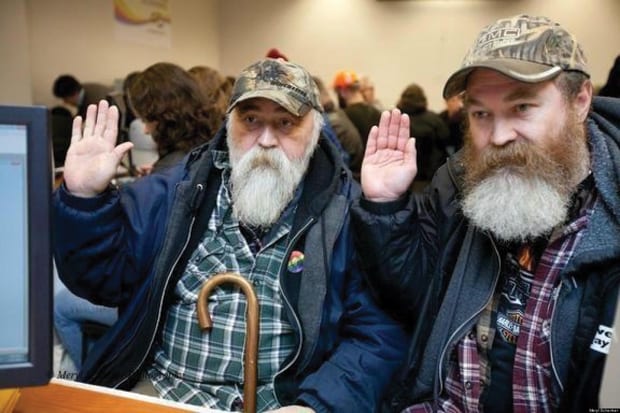
BEAR BLISS | One-time Dallas residents Larry Duncan and Randy Shepherd apply for a marriage license in Seattle on Dec. 6. (Meryl Schenker)
4.
On the same day one state began issuing marriage licenses to same-sex couples, the U.S. Supreme Court agreed to hear two cases involving marriage equality.
Support for marriage had been growing all year. After Vice President Joe Biden voiced his support on Meet the Press, President Barack Obama officially “evolved” a few days later.
Legislatures in three states — Maine, Maryland and Washington — passed marriage equality this year. Governors in all three signed the bills into law. But the National Organization for Marriage, with support from the Catholic Church, the Mormon church and fundamentalist religious groups, halted implementation of the laws by getting referenda on the ballot in those states.
In 2009, voters in Maine blocked marriage equality after it passed the Legislature. But this year they gave their approval. So did voters in Maryland and Washington. And in Minnesota, voters rejected a state anti-marriage amendment, clearing the way for that Legislature to possibly consider marriage equality next year.
The votes marked the first four times LGBT rights had prevailed at the ballot box following some 30 defeats. The outcome also brought the number of states with marriage equality to nine, plus the District of Columbia.
Then, on Dec. 7, the Supreme Court announced it would hear two marriage cases.
The first is the Proposition 8 case challenging California’s amendment banning same-sex marriage. Had the high court declined to hear Prop 8, marriage would have resumed in California the next week. Instead, justices will hear arguments next spring in Perry v. Hollinsworth.
California officials refused to appeal the lower court ruling declaring Prop 8 unconstitutional. So it’s possible the Supreme Court will limit its ruling to whether defenders of the amendment have standing. However, if the court strikes down Prop 8 on the merits, it could affect every anti-gay state marriage amendment that has passed.
On the flip side, should the court uphold Prop 8 on the merits, it would be a major setback to LGBT equality that could take decades to overcome.
The court will also hear widow Edie Windsor’s case challenging the Defense of Marriage Act. Of all the cases pending, this is the one LGBT legal experts hoped the court would take. The case involves a couple who had been together 45 years and is a clear example of tax discrimination. Had the couple been heterosexual, the surviving partner would not have owed $350,000 in estate tax.
Decisions in both the Prop 8 case and the DOMA case are expected in late June 2014.
The same day the court announced it would hear them, Washington state issued its first licenses to same-sex couples. Two days later, more than 1,000 same-sex couples were married.
In Maine, marriage begins on Dec. 29. Some counties in Maryland have already begun issuing marriage licenses for ceremonies to begin on New Years Day.
This article appeared in the Dallas Voice print edition December 28, 2012.


